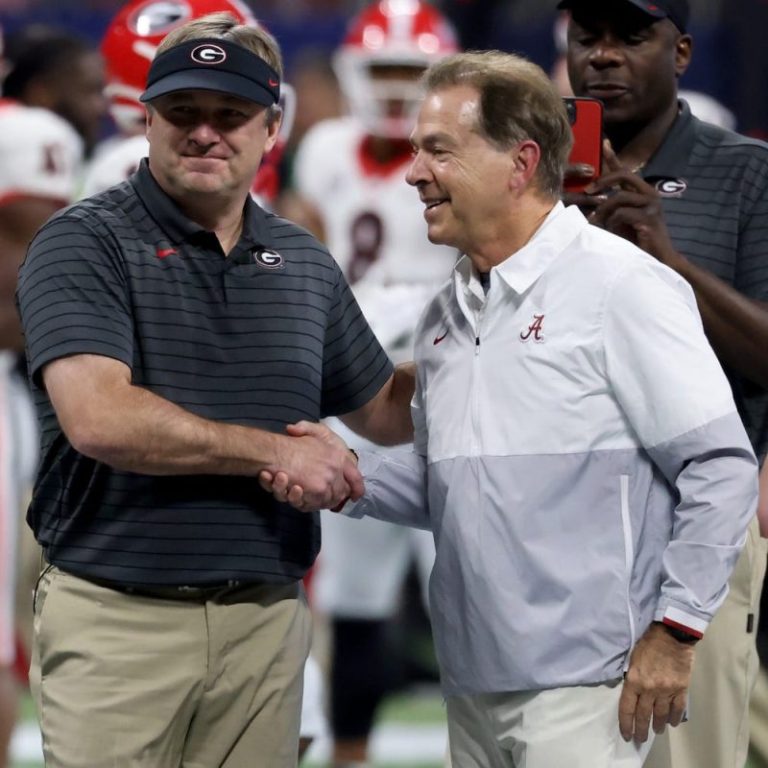The torch is in Kirby Smart’s grasp, the reign of power transferred. The only question left is how long he’ll retain the sceptre.
Smart wins like college football’s best coach. The Georgia boss motivates and develops like college football’s best coach. His recruiting machine hums uninterrupted, and he’s recently weaponized the transfer portal.
After years as wingman to overlord Nick Saban, the understudy headed out on his own and methodically usurped the throne.
Georgia, in January, became the sport’s first back-to-back champion since Alabama’s 2011-12 teams achieved the feat. A historic three-peat would cement Saban’s Crimson Tide as a fading object in Smart’s rearview mirror.
But beware the pothole that looms in front of Georgia, a snare created by the twin exits of its star quarterback and offensive architect.
The Baltimore Ravens hired Georgia offensive coordinator Todd Monken on Tuesday, completing a much-anticipated departure that Monken telegraphed before the national championship game when he described himself as a vagabond.
Smart, prepared for the transition, swiftly promoted analyst Mike Bobo to offensive coordinator.
Smart’s hire was an easy one – maybe too easy. Unimaginative, at least.
Bobo, the 48-year-old former Georgia quarterback, is an SEC mainstay, an established recruiter and a polished quarterback developer.
But this hire is as bland as Smart’s hire of Monken was bold.
Bobo’s career zenith occurred a decade ago while working for Mark Richt. More recently, he failed to spark South Carolina in his lone season as offensive coordinator in 2020, and he was fired after one season in that role at Auburn.
Even as Georgia gazes into a talent-laden future, other programs have been knocked off course after the combination punch of losing a standout quarterback and prized offensive mind.
Clemson’s offense lost its way after quarterback Trevor Lawrence and coordinator Tony Elliott departed after the 2020 season, the Tigers’ last time appearing in the College Football Playoff.
The exodus of once-in-a-generation quarterback Joe Burrow and key offensive engineer Joe Brady toppled Ed Orgeron at LSU.
Cam Newton flourished in Gus Malzahn’s offense. Then Newton departed, Malzahn left a year later, and Gene Chizik’s tenure, like Orgeron’s, cratered two seasons after winning a national championship.
Monken’s exit is neither surprising nor unique. Ten SEC programs installed new offensive coordinators this offseason. Such hires are especially important for a coach trained in defense, like Smart or Saban – or Orgeron or Chizik, for that matter.
Let me be clear: Smart is in no danger of duplicating Chizik’s fizzle or falling into an Orgeron-sized abyss. His program is on sturdy footing. Even before Monken and Bennett came along, Smart had elevated Georgia into the vicinity of the elite. Smart is too good a recruiter, developer and defensive schemer for Georgia to fade into mediocrity.
But enduring the loss of fulcrums like a Heisman Trophy finalist quarterback and an invigorating offensive coordinator is rarely as easy as Saban made it look.
Saban took teams to either the BCS national championship game or the College Football Playoff with seven different offensive coordinators and eight quarterbacks.
Saban’s offensive coordinator hires ranged from former head coaches he scooped off the scrap heap – Lane Kiffin, Steve Sarkisian and Bill O’Brien – to Jim McElwain, whose only FBS coordinator experience before Alabama was a lone season orchestrating Fresno State’s offense.
Rarely does Saban promote from within.
Smart’s hire of Monken is more reflective of a move Saban would make than his promoting Bobo.
This hire more resembles Smart’s initial installment of Jim Chaney, a proven veteran whose best days were behind him, or his promotion of James Coley after Chaney exited.
Coley didn’t pan out, and entering 2020, Smart needed a hire who would jumpstart Georgia’s middling attack and transition the Bulldogs from a heavy-hitter struggling to reach its peak to an unstoppable force reflective of its deep cache of talent.
An Air Raid disciple from Mike Gundy’s coaching tree, Monken didn’t exactly scream Georgia football. That’s what made Smart’s choice so intrepid.
Monken blended Georgia’s bullying run game with a more passing-friendly approach, especially after Bennett developed and grew into his system.
By 2022, Georgia’s offense ranked among the nation’s best units and its most balanced. The Bulldogs were the only team to rank in the top 10 nationally in rushing and passing. A good system paired with oodles of talent helped the cause, but Monken also proved a brilliant play-caller who used motions and shifts to manipulate defenses and scheme playmakers into space.
An optimistic view of the Bobo hire is that he spent last season as an offensive aide, so this promotion allows for systemic preservation. Plus, Colorado State produced one of its best offenses ever with Bobo as coach in 2017, and, under Richt, Bobo became instrumental in developing some of Georgia’s best quarterbacks.
That track record should not be ignored as Georgia prepares to elevate veteran backup Carson Beck to starter.
The pessimistic view of this appointment is the reality that Bobo’s career has been in a downward arc since 2017.
This changeover of quarterback and coordinator marks Smart’s final test.
Just how indispensable were Bennett and Monken?
All that’s left for Smart to complete his power heist is proving he can hire like college football’s greatest coach and endure transition in prominent areas of his program.

